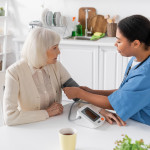How caregivers can safely provide care when they have a cold
 As a caregiver, your role is pivotal to the well-being of your loved one or patient. Whether you’re looking after an aging parent, a child with special needs, or a person with chronic illness, your responsibility requires compassion, attention, and consistency. But what happens when you get sick—specifically, when you catch a common cold? You may worry about how your condition will affect your caregiving responsibilities, but with the right precautions, you can still provide safe and effective care while minimizing the risk of spreading illness.
As a caregiver, your role is pivotal to the well-being of your loved one or patient. Whether you’re looking after an aging parent, a child with special needs, or a person with chronic illness, your responsibility requires compassion, attention, and consistency. But what happens when you get sick—specifically, when you catch a common cold? You may worry about how your condition will affect your caregiving responsibilities, but with the right precautions, you can still provide safe and effective care while minimizing the risk of spreading illness.
Here are some key steps to follow when you’re a caregiver dealing with a cold, ensuring both your health and the health of the person you care for remain a priority.
1. Prioritize Hygiene and Sanitation
The first and most important step when caring for others while sick is maintaining proper hygiene. Colds are viral infections that can spread easily through respiratory droplets. When you cough, sneeze, or even touch your face, the virus can spread to surfaces or directly to those around you. In order to reduce this risk, you should take extra care to wash your hands frequently with soap and water for at least 20 seconds. If soap and water aren’t available, use an alcohol-based hand sanitizer that contains at least 60% alcohol.
In addition to handwashing, it’s important to disinfect frequently touched surfaces like doorknobs, light switches, remote controls, and phones. A good practice is to clean surfaces multiple times a day, especially if you’re sharing them with your care recipient. If you’re providing direct care, consider wearing disposable gloves to further reduce the risk of cross-contamination.
2. Wear a Mask When Possible
While a cold is typically not as severe as the flu or other respiratory infections, it’s still contagious. Wearing a mask can greatly reduce the chances of spreading germs to the person you are caring for. A mask, especially in close proximity, can prevent you from unintentionally infecting your loved one. This is especially important if your care recipient has a compromised immune system, is elderly, or is in another vulnerable category.
Choose a mask that fits snugly over your nose and mouth, ensuring there are no gaps where germs can escape. Make sure to change the mask if it becomes wet or dirty, and wash your hands immediately after touching the mask.
3. Limit Close Contact
While it may not always be possible to avoid physical closeness, it’s a good idea to limit direct contact when you’re sick. If you typically offer hands-on care like bathing, dressing, or grooming, see if you can adjust your routine temporarily. Instead, opt for tasks that allow for physical distance or use tools that minimize direct interaction. For example, instead of helping your loved one take medication directly, guide them to administer it themselves or ask a trusted friend or family member to assist.
If the situation allows, consider having someone else temporarily take over tasks that require close contact, such as physical therapy, personal care, or meal preparation. This will not only reduce the risk of spreading the cold but will also allow you some much-needed time to rest and recover.
4. Practice Self-Care
Even though your role as a caregiver requires you to give to others, it’s equally important to take care of your own health, especially when you’re feeling under the weather. Adequate rest, hydration, and nutrition will help you recover faster and better manage the responsibilities of caregiving.
Make sure to sleep as much as possible and take breaks when necessary. Stay hydrated by drinking water, herbal teas, or broths, and eat nutritious meals to fuel your body. You may want to consider asking a family member or friend to step in for a few hours or even a day so you can rest properly. Your well-being is essential to providing care, and pushing yourself too hard can make your recovery longer and more difficult.
5. Use Over-the-Counter Remedies Cautiously
If your cold symptoms are mild, you might feel like you can push through with over-the-counter (OTC) medications like decongestants or pain relievers. While these medications can help ease symptoms like a sore throat, headache, or congestion, be mindful of their side effects. Some OTC drugs may cause drowsiness, dizziness, or even impair your ability to focus. Be cautious when using these remedies, especially if you’re responsible for tasks like administering medications to your care recipient.
Always check with your doctor before using any medications to ensure they won’t interfere with your existing health conditions or those of the person you’re caring for. If you’re unsure, a trusted family member or healthcare provider may be able to guide you.
6. Stay Informed About the Care Recipient’s Health
If you’re feeling unwell, it’s important to stay vigilant about the health of the person you’re caring for. Watch for any changes in their condition, as illness can sometimes exacerbate their existing symptoms. For example, if your loved one has a chronic condition like diabetes or respiratory issues, a cold might affect their health more severely than it would for someone without those conditions.
Communicate openly with your care recipient (if they’re able) about how you’re feeling and discuss any necessary adjustments to care. In some cases, you may want to contact their healthcare provider to inform them of your illness and ask for any additional guidance.
7. Know When to Seek Help
Finally, know your limits. If you find that your symptoms worsen, or if you’re too fatigued to care for your loved one safely, it’s time to ask for help. Temporary assistance from another family member, a professional caregiver, or a volunteer service can give you the respite you need to recover without compromising your loved one’s care.
If the person you care for shows signs of illness, don’t hesitate to consult their doctor or healthcare team to ensure they’re getting the right care as well.
Being a caregiver is demanding under any circumstance, but when you’re sick, it can be particularly challenging. By prioritizing hygiene, limiting contact, and practicing self-care, you can continue to provide safe and effective care to your loved one while also protecting your own health. Remember that it’s okay to ask for help when needed, and taking care of yourself is essential to being the best caregiver you can be.
Being proactive and mindful about these steps will help ensure that both you and your care recipient stay safe and healthy during the cold season.






